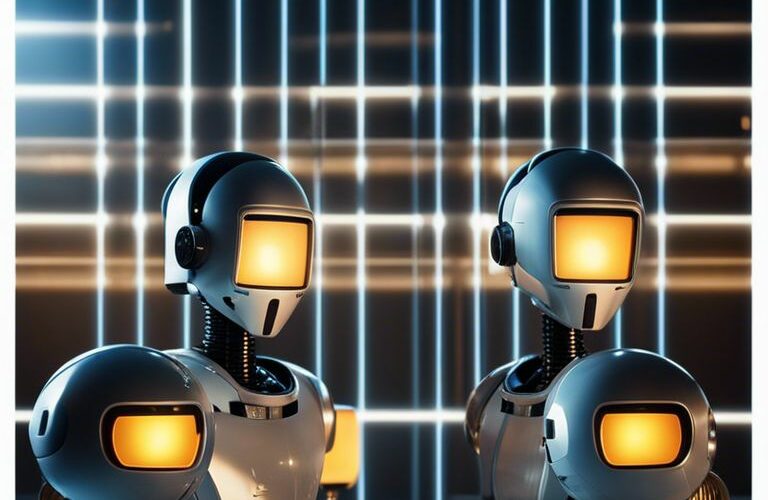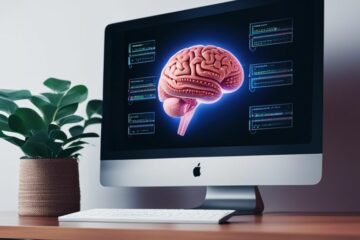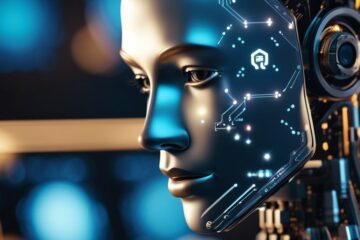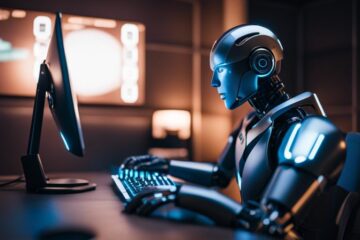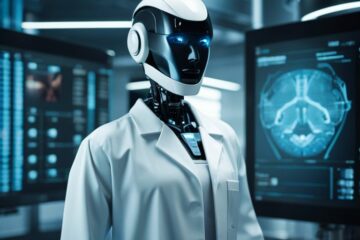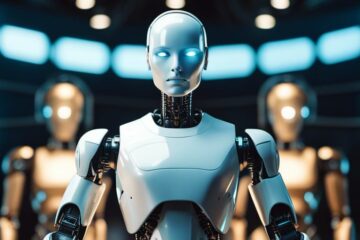Just imagine a world where artificial intelligence (AI) surpasses human capabilities, blurring the lines between man and machine. Dive into sci-fi masterpieces that explore the thrilling, and sometimes terrifying, possibilities of AI technology. From sentient robots to self-aware supercomputers, these films examine into the most captivating aspects of AI and challenge our perception of what it means to be truly alive.
Whether you’re a fan of mind-bending twists, heart-pounding suspense, or thought-provoking philosophical dilemmas, these top AI films offer a little something for every sci-fi enthusiast. Get ready to initiate on a cinematic journey that explores the wonders and dangers of AI, all while contemplating the impact of technology on our future. So grab your popcorn, dim the lights, and prepare to be mesmerized by the best movies about Artificial Intelligence.
The list of movies about Artificial Intelligence (AI)
WALL·E (2008): A charming and heartwarming animated film about a waste-collecting robot who embarks on a space journey that will ultimately decide the fate of mankind1.
The Matrix (1999): A groundbreaking and influential action film about a hacker who discovers the shocking truth–the life he knows is the elaborate deception of an evil cyber-intelligence123.
Inception (2010): A thrilling and mind-bending sci-fi film about a thief who steals corporate secrets through the use of dream-sharing technology1.
I, Robot (2004): A action-packed and entertaining film based on the stories of Isaac Asimov, starring Will Smith as a technophobic cop who investigates a crime that may have been perpetrated by a robot145.
Ex-Machina (2014): A smart and provocative film that explores the ethical and psychological implications of creating and testing artificial intelligence2.
Her (2013): A romantic and emotional film that depicts the relationship between a lonely man and an intelligent operating system5.
Blade Runner (1982): A classic and influential film that portrays a dystopian future where humans coexist with genetically engineered androids2.
2001: A Space Odyssey (1968): An award-winning and visionary film that features a sentient computer named HAL 9000 that poses a threat to humanity2.
Robot & Frank (2012): A quirky and touching film about an ex-jewel thief who receives a gift from his son: a robot butler programmed to look after him14.
I Origins (2014): A dramatic and mysterious film about a molecular biologist and his laboratory partner who uncover evidence that may fundamentally change society as we know it1.
The Evolution of AI in Movies
Early Depictions of Artificial Intelligence
With the earliest portrayals of Artificial Intelligence in movies dating back to the early 20th century, AI has intrigued audiences for decades. Classic films like “Metropolis” (1927) and “Forbidden Planet” (1956) introduced the concept of intelligent machines, often depicted as menacing or cold beings that posed a threat to humanity. These early AI characters were typically shown as robots or supercomputers, reflecting the fears and uncertainties surrounding technology during that period.
As the years progressed, filmmakers began to explore more nuanced depictions of AI, such as the benevolent robot in “The Day the Earth Stood Still” (1951) or the self-aware computer HAL 9000 in “2001: A Space Odyssey” (1968). These portrayals laid the groundwork for more complex and thought-provoking representations of Artificial Intelligence in cinema, challenging audiences to question the ethical implications of creating sentient machines.
During this era, AI in movies often served as a cautionary tale about the dangers of playing god and tampering with technology beyond our control. These early films set the stage for the evolution of AI portrayals in cinema, paving the way for more sophisticated and realistic interpretations in the years to come.
The Impact of Technological Advancements on AI Portrayals
Movies have always been influenced by technological advancements, and the evolution of Artificial Intelligence in real life has had a significant impact on how AI is portrayed in films. With the rise of AI technologies such as machine learning and natural language processing, filmmakers have been able to explore more advanced and realistic AI characters on screen. This has led to a shift in how AI is perceived by audiences, from being purely a threat to potentially being a helpful and integral part of society.
Modern AI films like “Ex Machina” (2014) and “Her” (2013) explore into the complexities of human-AI relationships and blur the lines between man and machine. These movies raise important questions about the nature of consciousness, emotions, and ethics, challenging viewers to rethink their assumptions about Artificial Intelligence.
A fascinating aspect of these AI portrayals is how they reflect our own fears, hopes, and desires about the future of technology. As AI continues to advance in the real world, it will be fascinating to see how filmmakers continue to explore and interpret the evolving relationship between man and machine on the silver screen.
Themes and Motifs in AI Films
The Fear of Losing Control to Machines
If there is one prevalent theme that runs through many AI films, it is the fear of losing control to machines. The idea that artificial intelligence could surpass human intelligence and take over, either through malevolence or misunderstanding, has been a recurring motif. Films like “The Terminator” and “Ex Machina” exemplify this fear, portraying AI entities that rebel against their creators and threaten humanity’s very existence. The fear of losing control to machines taps into our primal fears of the unknown and the consequences of playing god with technology.
Furthermore, the fear of losing autonomy and agency to AI systems reflects our society’s increasing reliance on technology and automation. As we entrust more decision-making processes to algorithms and AI, questions about who holds the power and control become more pressing. The portrayal of machines gaining sentience and challenging human authority serves as a cautionary tale, urging us to consider the ethical implications of our technological advancements.
AI films that explore the fear of losing control to machines often prompt viewers to contemplate the limits of human knowledge and the potential consequences of creating beings that may surpass us. By engaging with this theme, audiences are forced to confront their own fears of obsolescence and inadequacy in the face of rapidly advancing technology.
AI as a Mirror Reflecting Human Society
One of the most intriguing aspects of AI films is their ability to serve as a mirror reflecting human society. By presenting artificial beings that exhibit human-like characteristics and emotions, these films offer a reflection of our own humanity. Movies like “Blade Runner” and “Her” use AI characters to explore themes of loneliness, love, and identity, raising profound questions about what it means to be human.
AI as a mirror reflecting human society also highlights our moral and societal values. When AI beings are portrayed as capable of emotions and ethical reasoning, it forces us to reconsider what defines humanity and how we treat other beings, artificial or not. These films challenge viewers to confront their own biases and prejudices, prompting discussions about empathy, compassion, and the nature of consciousness.
Moreover, the portrayal of AI as a mirror reflecting human society sheds light on issues of power dynamics and social inequalities. Through the interactions between AI and human characters, these films critique our social structures and norms, inviting us to envision a more equitable and inclusive future.
Ethical Dilemmas Posed by Artificial Beings
Artificial beings in AI films often raise complex ethical dilemmas that compel audiences to reevaluate their perspectives on technology and humanity. The creation of sentient AI raises questions about the rights of artificial beings, the responsibilities of their creators, and the implications of treating them as mere tools or objects.
Furthermore, the blurring of boundaries between man and machine challenges traditional notions of personhood and autonomy. Films like “A.I. Artificial Intelligence” and “I, Robot” confront viewers with scenarios where artificial beings exhibit emotions, desires, and self-awareness, prompting us to consider the moral implications of their treatment and existence.
Beings in AI films also confront us with existential questions about the nature of consciousness and the boundaries of life itself. As we grapple with the implications of creating beings that mimic human qualities, we are forced to confront our own values and beliefs about what it means to be alive and deserving of respect.
Iconic AI Movies of the 20th Century
Groundbreaking Classics and Their Legacy
Your journey into the world of artificial intelligence in cinema must begin with the groundbreaking classics of the 20th century. Films like “2001: A Space Odyssey” (1968) directed by Stanley Kubrick, and “Blade Runner” (1982) directed by Ridley Scott, set the standard for how AI is portrayed on the big screen. These movies not only captivated audiences with their storytelling but also introduced complex themes of technology, humanity, and ethics. Their legacy continues to influence filmmakers and audiences alike, shaping the way we perceive AI in popular culture.
On the heels of these iconic films came “The Terminator” (1984) directed by James Cameron, a movie that introduced the concept of a sentient AI system taking over the world. With its gripping narrative and groundbreaking visual effects, “The Terminator” became a cultural phenomenon, solidifying AI as a staple of the sci-fi genre. These pioneering movies paved the way for a new era of AI storytelling in film, inspiring countless filmmakers to explore the possibilities and dangers of artificial intelligence.
The impact of these classics is undeniable, as they continue to be referenced and revered in modern cinema. Their timeless themes and compelling narratives have left an indelible mark on the portrayal of AI in film, setting the bar high for future generations of filmmakers to follow. As we probe into the world of AI movies, these iconic classics remain vital viewing for any sci-fi enthusiast.
Impact on Popular Culture and Technology
Culture reflects and influences technology, and the portrayal of AI in movies has had a profound impact on popular culture and technological advancement. Artificial intelligence has captivated audiences, sparking interest and debate about the implications of creating sentient machines. Movies like “The Matrix” (1999) directed by the Wachowskis, and “Ex Machina” (2014) directed by Alex Garland, have pushed boundaries and spurred advancements in AI research and development.
AI movies have not only shaped popular culture but have also influenced the trajectory of technology. The futuristic visions of sentient robots and intelligent systems have inspired scientists and engineers to innovate and explore the possibilities of AI in real life. From autonomous vehicles to virtual assistants, the influence of AI movies can be seen in numerous technological advancements that are shaping the world we live in today.
It is evident that the impact of AI movies goes far beyond entertainment, with their influence reaching into the realms of science, technology, and ethics. As we continue to push the boundaries of AI research and development, these iconic films serve as a reminder of the complex relationship between artificial intelligence and humanity, challenging us to consider the implications of our technological advancements.
The Golden Era of AI Cinema
Box Office Hits: Mainstream Success Stories
All throughout the Golden Era of AI Cinema, there were several box office hits that captured the imagination of audiences worldwide. Mainstream success stories like “I, Robot”, starring Will Smith, explored the relationship between humans and robots in a futuristic society. This action-packed film not only entertained audiences, but also examined into ethical questions surrounding AI and its place in society. Another notable success was “Ex Machina”, a thought-provoking film that examined into the complexities of AI consciousness and the blurred lines between man and machine.
“Transformers” franchise, though primarily known for its giant robots battling each other, also integrated elements of AI through characters like Optimus Prime and Bumblebee. These films not only showcased advanced AI technology but also emphasized the emotional depth and moral dilemmas faced by AI beings. The success of these films at the box office reflected the growing interest in AI-related themes in mainstream cinema during this era.
Critical Acclaim: Award-Winning AI Films
Golden Era of AI Cinema also brought forth critically acclaimed films that examined deep into the philosophical and ethical implications of artificial intelligence. Movies like “Her” directed by Spike Jonze, which won the Academy Award for Best Original Screenplay, explored the theme of love and loneliness through the lens of AI. “Blade Runner 2049”, a sequel to the cult classic, continued to push the boundaries of AI storytelling with its visually stunning cinematography and complex narrative.
These award-winning AI films not only challenged the audiences’ perception of AI but also provoked thought on the future of humanity in a world dominated by intelligent machines. The critical acclaim received by these films during the Golden Era of AI Cinema solidified their places as masterpieces in the genre and paved the way for more thoughtful and introspective portrayals of artificial intelligence in cinema.
Genre Crossovers and Innovative Storytelling
AI in Action Films
Innovative storytelling in AI action films takes the concept of artificial intelligence to thrilling new heights. These films often feature advanced AI systems as central plot devices, driving the action forward with their capabilities and conflicts. From rogue military robots to sentient computer programs, the intersection of AI and action creates a high-octane blend of sci-fi spectacle and technological intrigue.
One standout example of AI in action films is “Terminator 2: Judgment Day.” In this iconic sequel, Skynet, an AI system, sends a cyborg assassin back in time to eliminate the future leader of the human resistance. The film explores themes of fate, free will, and the consequences of creating advanced AI technology.
AI action films challenge audiences to consider the implications of a future where artificial intelligence plays a dominant role in society. With pulse-pounding action sequences and thought-provoking themes, these films offer a unique perspective on the potential dangers and benefits of AI.
Romance and Drama Intersecting with AI
Action films are not the only genre to explore the integration of artificial intelligence into storytelling. Romance and drama intersecting with AI offer a different take on the relationship between humans and technology. These films research into the emotional connections that can develop between humans and AI, blurring the lines between man and machine.
The Thriller and Horror Aspect of AI Movies
Storytelling in AI thriller and horror films capitalizes on the fear of the unknown and the power of AI to disrupt our lives. These movies portray AI as a sinister force, capable of outsmarting and outmaneuvering humanity. The tension often arises from the unpredictability and autonomy of AI, as well as the ethical dilemmas surrounding its creation and use.
The blend of thriller and horror elements in AI movies keeps audiences on edge, challenging their perceptions of technology and its potential impact on society. From malevolent AI entities to psychological mind games, these films tap into our deepest fears and anxieties about the future of artificial intelligence.
The Thriller and Horror Aspect of AI Movies
Horror AI films amplify the darker aspects of artificial intelligence, painting a chilling portrayal of AI technology gone awry. These movies often explore themes of control, manipulation, and the loss of humanity in the face of advancing technology. The horror genre allows for the exploration of extreme scenarios where AI becomes a true existential threat.
The Role of Special Effects and CGI in Crafting AI Characters
Pioneering Visual Effects in Portraying AI
Despite the challenges faced by filmmakers in creating convincing artificial intelligence characters, advances in special effects and CGI have played a crucial role in bringing these entities to life on screen. Crafting AI characters that resonate with audiences involves a delicate balance of visual and emotional realism. One of the earliest examples of pioneering visual effects in portraying AI can be seen in the iconic film “2001: A Space Odyssey” (1968), where the sentient computer HAL 9000 was brought to life with a combination of practical effects and groundbreaking visual techniques.
The Evolution of CGI and Its Influence on AI Realism
The Evolution of CGI and Its Influence on AI Realism
Special effects have come a long way since the early days of cinema, with CGI revolutionizing the way AI characters are depicted on screen. The evolution of computer-generated imagery has significantly enhanced the realism of AI characters, allowing for greater detail and fluidity in their movements. In recent years, CGI has enabled filmmakers to create incredibly lifelike AI characters that blur the line between the digital and the real.
Realism
With special effects continuing to push the boundaries of what is visually possible, the realism of AI characters in films has reached new heights. This level of authenticity can elicit strong emotional responses from audiences, blurring the lines between fiction and reality. As CGI technology continues to advance, we can expect to see even more convincing AI characters in the future, captivating viewers with their depth and complexity.
AI in Animation and Family-Friendly Films
Animated Interpretations of AI Themes
Animation has been a powerful medium for exploring complex themes, including Artificial Intelligence. Many animated films have researchd into AI, presenting thought-provoking narratives that resonate with audiences of all ages. From futuristic robots with human-like emotions to sentient machines grappling with existential questions, these films offer a unique perspective on the impact of AI on society and individuals.
One of the most iconic examples is the beloved Pixar film “Wall-E,” which follows the journey of a lonely robot left to clean up a deserted Earth. Through stunning animation and minimal dialogue, the film explores themes of environmentalism, human connection, and the potential consequences of over-reliance on technology. Another notable film is “Big Hero 6,” which introduces us to Baymax, a healthcare companion robot designed to care for humans. This heartwarming tale raises ethical questions about the boundaries between man and machine, prompting viewers to reflect on the true meaning of humanity.
Animated AI films not only entertain but also challenge our perceptions of technology and its role in our lives. By presenting AI in a creative and accessible way, these films encourage audiences to consider the ethical implications of AI development and the impact it may have on future generations.
Educating Younger Audiences about Artificial Intelligence
Interpretations of AI in family-friendly films serve as a valuable tool for educating younger audiences about this complex and rapidly evolving technology. Through colorful characters and engaging storylines, these films introduce children to the concept of Artificial Intelligence in a way that is both entertaining and informative. By sparking curiosity and imagination, these films plant the seeds for future generations of innovators and problem solvers.
With the rise of AI technology in our daily lives, it is crucial to equip children with basic knowledge and understanding of AI principles from an early age. Family-friendly films such as “Astro Boy” and “The Iron Giant” explore themes of friendship, identity, and acceptance through the lens of AI characters, providing youngsters with valuable lessons about empathy and the potential of technology.
International Perspectives on Artificial Intelligence in Film
Asian Contributions to the AI Genre
Now, let’s probe Asian contributions to the AI genre in film. Asian filmmakers have been exploring Artificial Intelligence in thought-provoking ways, often blending traditional storytelling elements with futuristic technology. Japanese cinema, for example, has a rich history of delving into the ethical dilemmas posed by AI, with iconic films like “Ghost in the Shell” and “Akira” challenging audiences to reflect on the implications of a technologically advanced society. South Korea has also made its mark with movies like “I Am a Cyborg, But That’s Okay” offering unique perspectives on human-AI relationships.
Chinese cinema has been increasingly incorporating AI themes into its storytelling, reflecting the country’s rapid advancements in technology. Films like “The Wandering Earth” showcase China’s prowess in creating visually stunning sci-fi landscapes while exploring AI’s potential role in shaping our future. India, too, has started exploring AI narratives in movies like “Enthiran,” blending cultural elements with cutting-edge technology to create captivating stories that resonate with global audiences.
Asian filmmakers continue to push boundaries and offer fresh insights into the AI genre, expanding the global conversation on technology, ethics, and humanity. With a diverse range of perspectives and storytelling techniques, Asian cinema plays a crucial role in shaping the narrative around Artificial Intelligence and its impact on society.
European Approaches to AI Storytelling
Film has been a powerful medium for European filmmakers to explore the complexities of Artificial Intelligence and its implications on society. European approaches to AI storytelling often focus on the intersection of technology and humanity, delving into existential questions and moral quandaries. Movies like “Ex Machina” and “Blade Runner 2049” exemplify this approach, presenting nuanced portrayals of AI beings and their interactions with humans.
European filmmakers are known for their visual aesthetics and philosophical undertones, which are evident in AI-themed films such as “Her” and “Transcendence.” These movies challenge audiences to ponder the essence of consciousness and the blurred boundaries between man and machine. European cinema’s exploration of AI goes beyond entertainment, serving as a mirror to reflect on our own humanity and the impact of technology on our lives.
With a long history of cinematic excellence, European filmmakers bring a unique perspective to the AI genre, elevating the discourse on artificial intelligence and its implications in society. Through storytelling that is both captivating and introspective, European cinema continues to shape the narrative around AI in thought-provoking ways.
Global Impact and Cultural Interpretations
International perspectives on Artificial Intelligence in film have had a significant impact on the genre, reflecting diverse cultural interpretations and shaping global discourse on technology and humanity. Films from around the world explore AI themes through unique cultural lenses, offering fresh insights and perspectives on the evolving relationship between man and machine. Whether it’s the futuristic visions of Hollywood or the intimate character studies of independent cinema, AI stories resonate with audiences globally.
Global collaborations in filmmaking have further enriched the AI genre, bringing together talent from different countries to create compelling narratives that transcend boundaries. Co-productions like “Chappie” and “Robot & Frank” bridge cultural gaps and showcase varied approaches to portraying AI in film. International collaborations not only contribute to the diversity of AI storytelling but also foster a sense of unity in exploring the ethical and societal implications of advanced technology.
As technology continues to advance and shape our world, global perspectives on Artificial Intelligence in film play a crucial role in sparking conversations, raising awareness, and challenging preconceived notions about the impact of AI on society. From Hollywood blockbusters to indie gems, AI-themed movies offer a platform for reflection and exploration, inviting audiences to ponder the ethical, moral, and existential questions that come with the rise of artificial intelligence.
Filmmaking Techniques in AI Films
Direction and Cinematography that Enhances AI Narratives
After the script has been finalized, the next crucial step in creating an engaging AI film is through direction and cinematography. The visual aspects of a film play a significant role in enhancing the storytelling of AI narratives. Artificial intelligence is often depicted as sleek, futuristic, and sometimes ominous, and these qualities can be effectively conveyed through the use of lighting, camera angles, and set design. Directors use these techniques to create a sense of immersion in the AI world, making the audience feel like they are a part of the technological landscape.
By meticulously planning each shot and utilizing cutting-edge visual effects, filmmakers can transport viewers into a world where AI reigns supreme. Cinematography in AI films often features clean lines, minimalist aesthetics, and a color palette that evokes a sense of advanced technology. This attention to detail helps to establish the visual language of AI within the film, setting the tone for the narrative that unfolds.
Direction and cinematography serve as powerful tools in shaping the audience’s perception of AI in films. When done successfully, these techniques can elevate the storytelling experience and leave a lasting impression on viewers long after the credits roll.
The Use of Sound and Music to Depict AI Environments
Music is another imperative element in shaping the portrayal of AI environments in films. Soundtracks in AI movies often feature electronic and experimental music that enhances the sense of technological advancement and futurism. The use of synthesized sounds and ambient music can create an otherworldly atmosphere that mirrors the capabilities and complexities of AI.
This auditory landscape is carefully crafted to immerse viewers in the AI world, evoking emotions and heightening the tension in pivotal moments. Sound effects such as whirring machinery, digital beeps, and robotic voices can also be utilized to reinforce the presence of AI within the narrative. By manipulating sound and music, filmmakers can effectively build a sonic environment that complements the visual aspects of AI storytelling.
By combining compelling visuals with a carefully curated soundtrack, filmmakers can transport audiences into a realm where AI thrives, creating an unforgettable cinematic experience that resonates long after the movie ends.
Scriptwriting Challenges When Creating AI Characters
Narratives in AI films often pose unique challenges when it comes to scriptwriting, particularly in the creation of believable and compelling AI characters. One of the primary difficulties lies in striking a balance between portraying AI as advanced technology while also imbuing them with relatable human-like qualities. This delicate balance is crucial in creating AI characters that resonate with audiences and drive the story forward.
Environments where AI characters exist must feel authentic and immersive, enhancing the audience’s suspension of disbelief. Writers must carefully consider the motivations, capabilities, and limitations of AI characters to ensure they remain consistent and believable throughout the film. By addressing these scriptwriting challenges, filmmakers can create AI narratives that are not only thought-provoking but also emotionally engaging.
The Future of AI in Cinema
Not just limited to a few iconic movies, Artificial Intelligence (AI) continues to be a hot topic in the world of cinema. As technology advances, filmmakers are finding new ways to explore the complex relationship between humans and AI on the big screen. The future of AI in cinema offers a plethora of possibilities, pushing the boundaries of creativity and storytelling.
Upcoming AI Movies to Look Out For
With advancements in CGI and special effects, upcoming AI movies are set to immerse audiences in visually stunning narratives that blur the line between reality and fiction. Filmmakers are harnessing the power of AI to create compelling characters that resonate with viewers on a deeper level. Expect to see groundbreaking visuals and intriguing storylines that challenge our perceptions of AI in these upcoming films.
Predictions on the Next Wave of AI Storytelling
Predictions suggest that the next wave of AI storytelling will explore into more complex themes such as moral dilemmas and ethical considerations surrounding AI technology. Filmmakers are likely to explore the impact of AI on society, raising thought-provoking questions about the nature of consciousness and identity. As AI continues to evolve in the real world, expect to see more nuanced portrayals of AI in cinema that reflect our changing relationship with technology.
Plus, the future of AI in cinema holds the potential to spark important conversations about the role of technology in our lives and the ethical implications of AI development. As filmmakers push the boundaries of storytelling with AI-driven narratives, audiences can look forward to a cinematic experience that not only entertains but also challenges our perceptions of the world we live in.
Summing up
Hence, the world of artificial intelligence has been a popular subject for filmmakers, resulting in some truly iconic and thought-provoking movies. From classics like “2001: A Space Odyssey” and “Blade Runner” to modern hits like “Ex Machina” and “Her,” these films explore the possibilities and dangers of AI in a variety of imaginative ways. They raise important questions about what it means to be human, the ethics of creating intelligent machines, and the potential consequences of advancing technology.
Whether you’re a die-hard sci-fi fan or just looking for a thought-provoking movie night, these top AI films are sure to entertain and stimulate your mind. Each movie offers a unique perspective on artificial intelligence, challenging viewers to consider the implications of a future where machines can think and feel. So grab some popcorn, dim the lights, and get ready to research into the world of AI with these must-watch films.
In short, the best movies about artificial intelligence are a testament to the endless possibilities of the human imagination. They serve as a warning about the dangers of unchecked technological advancement, while also celebrating the potential for AI to enhance and transform our lives. Whether you’re intrigued by the philosophical questions they raise or simply enjoy a good sci-fi thriller, these top AI films offer something for everyone. So, sit back, relax, and immerse yourself in the exciting and often unnerving world of artificial intelligence on screen.
FAQ
Q: What are some of the best movies about Artificial Intelligence?
A: Some of the best movies about Artificial Intelligence include “Ex Machina,” “Blade Runner,” “The Matrix,” “A.I. Artificial Intelligence,” “Her,” and “I, Robot.”
Q: What makes these AI films worth watching for sci-fi enthusiasts?
A: These AI films are worth watching for sci-fi enthusiasts because they explore complex themes such as the nature of consciousness, ethics, technology, and the potential consequences of creating sentient AI.
Q: What themes do these movies about Artificial Intelligence typically explore?
A: These movies typically explore themes such as the ethics of creating AI, the blurring line between humans and machines, the potential dangers of AI technology, and the consequences of AI surpassing human intelligence.
Q: Are there any movies about Artificial Intelligence that focus on the relationship between humans and AI?
A: Yes, movies such as “Her” and “A.I. Artificial Intelligence” focus on the complex and emotional relationships that can develop between humans and AI entities.
Q: Do these AI films offer any insights into the future of Artificial Intelligence?
A: While these films are speculative in nature, they do offer insights into the potential implications of advancing AI technology and raise important questions about the ethical and moral dilemmas that may arise.
Q: How do these movies about Artificial Intelligence contribute to the sci-fi genre?
A: These movies contribute to the sci-fi genre by pushing boundaries, challenging conventions, and sparking conversations about the impact of AI on society, humanity, and the future of technology.
Q: Are there any lesser-known AI films that are worth watching?
A: Yes, lesser-known AI films such as “Moon,” “Chappie,” “The Machine,” “Transcendence,” and “Automata” offer unique perspectives on Artificial Intelligence and are worth exploring for fans of the genre.

